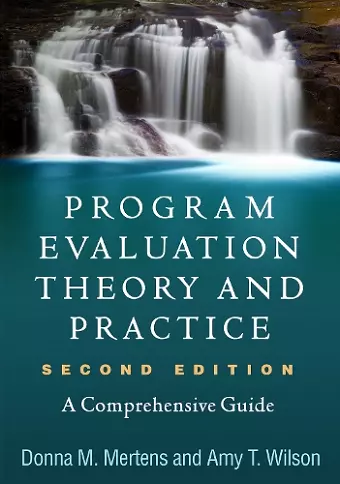Program Evaluation Theory and Practice, Second Edition
A Comprehensive Guide
Donna M Mertens author Amy T Wilson author
Format:Paperback
Publisher:Guilford Publications
Published:7th Dec '18
Should be back in stock very soon

This updated edition of Program Evaluation Theory and Practice combines theoretical insights with practical applications, enhancing evaluation skills across various fields.
The revised edition of Program Evaluation Theory and Practice offers a comprehensive exploration of both the theoretical and practical aspects of evaluation. This engaging volume has been updated to include additional evaluation approaches such as mixed methods and principles-focused evaluation, along with new data collection methods, including technologically based strategies. Readers can expect to find a wealth of examples from various fields, showcasing both small- and large-scale evaluations, many accompanied by reflective commentary from the evaluators themselves. This structure enhances the learning experience, providing insights into real-world applications of evaluation theory.
In Program Evaluation Theory and Practice, major theoretical paradigms are thoroughly explained, highlighting how these frameworks inform methodological choices. The text guides readers in clarifying their own theoretical assumptions, engaging with stakeholders, and developing pertinent evaluation questions. The book covers a range of designs, including quantitative, qualitative, and mixed methods, while also discussing data collection and sampling strategies. Furthermore, it emphasizes the importance of data analysis and effective communication of findings, ensuring that readers are well-equipped to implement evaluation strategies in their own contexts.
The new companion website enriches the learning experience by offering extensive online resources and tools organized by chapter. This edition also introduces several pedagogical features, such as reflection questions, practical activities, and a glossary, making it an invaluable resource for both students and practitioners in the field of evaluation.
"This textbook combines theory with concrete practical applications. The diverse case examples threaded throughout the chapters provide for a truly interdisciplinary text. The reflective commentaries from evaluators and the extended learning activities give students a deeper understanding. Features that set this text apart from others include the logical flow, which aligns with the process of evaluation; pedagogical activities in each chapter; explanations of the theoretical foundations of different evaluation approaches; and checklists and tables that students will continue to use as resources as they move through their programs and into practice.”--Kristin L. K. Koskey, PhD, Department of Educational Foundations and Leadership, University of Akron
"If I were permitted only one text to introduce students to the breadth of evaluation theory, methods, and practice, this would sit at the top of the list. The updated second edition offers the beginner an accessible, lively treatment of the distinctive approaches and techniques that make evaluation a uniquely exciting enterprise. Each chapter richly illustrates how an evaluator’s most basic assumptions inform choices in the field and distinguish evaluation from other applied forms of inquiry. Contemporary examples are drawn from diverse problem areas and settings, providing a window into the dilemmas, issues, and challenges confronting evaluators. Readers will discover a wide array of ideas and resources to support their successful design and execution of evaluation projects."--Robin Lin Miller, PhD, Department of Psychology, Michigan State University
"One of the reasons I selected this text for my course is its strong coverage of evaluation with marginalized and vulnerable populations, a topic that has been getting increasing attention in the field. Issues of social justice, power and privilege, and cultural competence are woven throughout.”--Colleen Fisher, PhD, Department of Social Work, University of Alabama at Birmingham
"The primary strength of this book is its grounding in principles of cultural responsiveness, social justice, and the transformative power of evaluation. It occupies a unique space in a sea of 'value-neutral' evaluation textbooks. I also appreciate the real-life evaluation examples. It is rare to find such well-chosen, carefully summarized, and annotated examples to use in a course. I have yet to see a better example of a text that combines the theory and practice of evaluation in one volume.”--Lauren P. Saenz, PhD, Department of Education, Bowdoin College
“The authors’ discussion of paradigms opens up interesting discussions of the ethical elements in program evaluation and the role of the evaluator. This is an excellent introduction to social science theory, models of program evaluation, and the process of research design, for instructors looking for a text that minimizes purely statistical topics.”--Gerasimos "Jerry" A. Gianakis, PhD, Institute for Public Service (retired), Suffolk University -
ISBN: 9781462532759
Dimensions: unknown
Weight: 1090g
620 pages
2nd edition